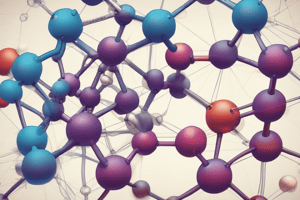Podcast
Questions and Answers
What is the central role of carbon atoms in organic chemistry?
What is the central role of carbon atoms in organic chemistry?
- Having the ability to form four bonds with other elements (correct)
- Forming three bonds with other elements
- Being the heaviest element in organic compounds
- Creating double bonds with hydrogen
In organic chemistry, covalent bonds can occur between:
In organic chemistry, covalent bonds can occur between:
- Any two metal elements
- Only hydrogen and oxygen
- Any two non-metal elements (correct)
- Metalloids and noble gases
How many pairs of shared electrons do double bonds in organic compounds have?
How many pairs of shared electrons do double bonds in organic compounds have?
- One pair
- Two pairs (correct)
- Three pairs
- Four pairs
What is the purpose of carbon sharing its valence electron pairs with hydrogen in organic compounds?
What is the purpose of carbon sharing its valence electron pairs with hydrogen in organic compounds?
How many different types of organic molecules are estimated to exist based on the text?
How many different types of organic molecules are estimated to exist based on the text?
What is the key concept in organic chemistry that involves understanding how to manipulate molecular structures through various reactions?
What is the key concept in organic chemistry that involves understanding how to manipulate molecular structures through various reactions?
Which process in organic chemistry involves the removal of a small fragment like water or ammonia from a larger compound?
Which process in organic chemistry involves the removal of a small fragment like water or ammonia from a larger compound?
What determines many characteristics like boiling point, solubility, and reactivity in organic molecules?
What determines many characteristics like boiling point, solubility, and reactivity in organic molecules?
In the context of acid-base concepts in organic chemistry, what are chemists trying to predict by understanding acid strength and base strength relationships?
In the context of acid-base concepts in organic chemistry, what are chemists trying to predict by understanding acid strength and base strength relationships?
Which fundamental area of chemistry is crucial for mastering organic chemistry principles, such as stoichiometry, thermodynamics, and kinetics?
Which fundamental area of chemistry is crucial for mastering organic chemistry principles, such as stoichiometry, thermodynamics, and kinetics?
Flashcards are hidden until you start studying
Study Notes
Organic Chemistry Basics: An Introduction
Organic chemistry is a fascinating field of study that revolves around carbon-containing compounds. It's a branch of science that focuses specifically on the chemical structures, properties, reactions, synthesis, and uses of these compounds. Here we will delve into some fundamental concepts related to this vibrant discipline.
The Carbon Atom
The central role of carbon atoms in organic chemistry stems from their ability to form four bonds with other elements, including hydrogen and oxygen. This versatility allows for the creation of countless complex molecular structures. In fact, it's estimated that there could be upwards of (10^{60}) different types of organic molecules.
Molecular Structures
Understanding how atoms connect together within molecules is crucial in organic chemistry. These connections, known as covalent bonds, can occur between any two nonmetal elements or between metal and non-metal elements. A bond forms when shared electrons fill in empty spaces between atomic orbitals. For example, one common type of bond found in organic compounds involves carbon sharing its valence electron pairs with hydrogen to create an unbroken ring structure called a cycle.
Types of Bonding
There are three main types of bonds in organic compounds: single bonds, double bonds, and triple bonds. Single bonds consist of only one pair of shared electrons; double bonds have two pairs, while triple bonds have three pairs. These differences affect the reactivity and geometry of molecules, which play significant roles in determining what happens during chemical reactions.
Reactions and Synthesis
In organic chemistry, understanding how to manipulate molecular structures through various reactions is key. Some common processes include:
- Substitution: The replacement of one functional group by another without breaking existing bonds within the compound.
- Addition: The formation of new bonds between atoms already present within the compound.
- Elimination: The removal of a small fragment like water or ammonia from a larger compound leaving behind a different smaller compound.
- Rearrangement: When part of a molecule changes position due to external influences or internal forces, such as heat or light exposure.
Each reaction typically results in either the formation of new compounds or the modification of existing ones according to certain rules and principles, making predictability possible amidst the vast array of potential outcomes.
Hydrogens and Functional Groups
Hydrogen plays a major role in classifying organic molecules based on the presence or absence of specific groups of atoms within them. These distinctive arrangements, known as functional groups, determine many characteristics like boiling point, solubility, and reactivity. Examples of functional groups include alkyl halides (-X), alcohols (-OH), carboxylic acids (-COOH), carbonyl groups (C=O), esters (C(=O)-OR), ethers (R-O-R'), and ketones (R-C(=O)-R').
Acid-Base Concepts
Acidity and basicity are also important aspects in organic chemistry. They involve the gain or loss of protons (H+ ions) by organic molecules. Understanding acid strength and base strength relationships helps chemists predict whether a given compound will accept or donate a proton under specific conditions, allowing for better control over reactions.
Mastering Fundamentals
To grasp these basics fully requires mastery of general chemistry principles—including stoichiometry, thermodynamics, and kinetics—as well as familiarity with laboratory techniques used in organic chemistry. By building upon this foundation, students can move forward confidently towards more advanced topics, ready to tackle increasingly complex structures and reactions characteristic of this dynamic research area.
Studying That Suits You
Use AI to generate personalized quizzes and flashcards to suit your learning preferences.




